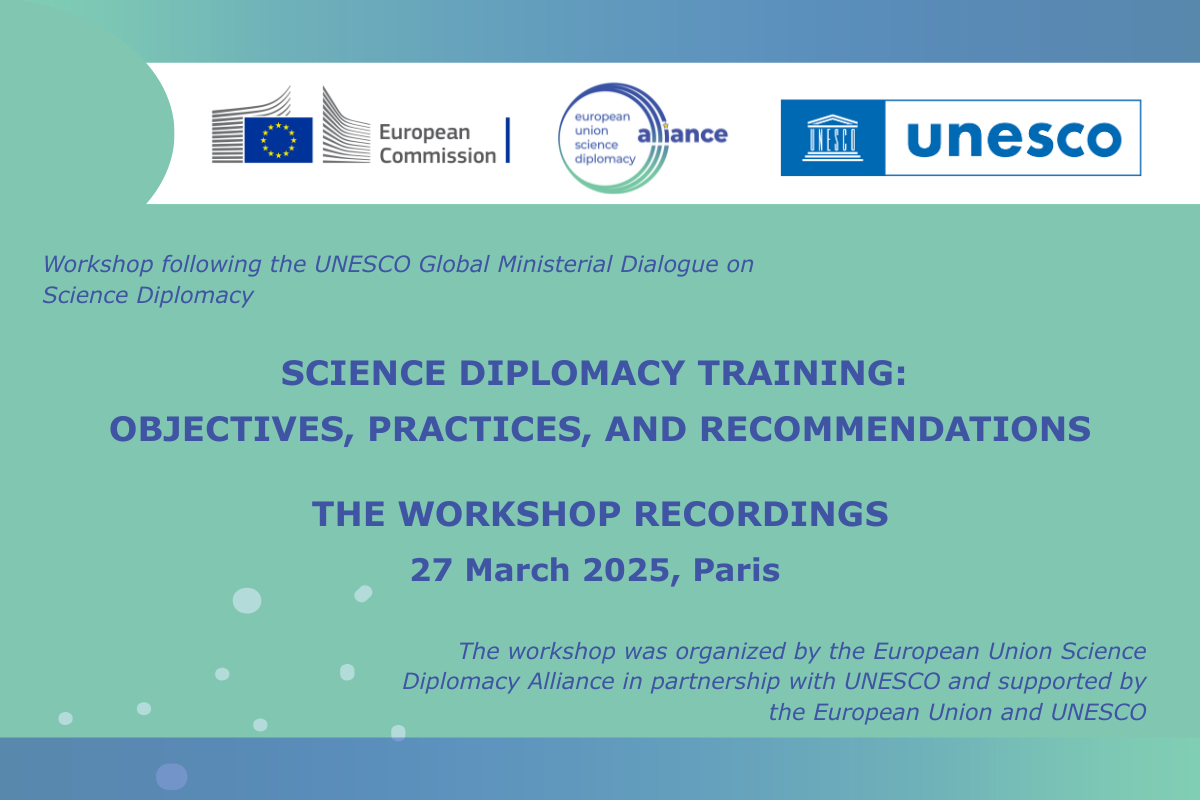The workshop “Science Diplomacy Training Science Diplomacy Training: Objectives, Practices, and Recommendations” recordings are available online

Recordings of the workshop “Science Diplomacy Training Science Diplomacy Training: Objectives, Practices, and Recommendations” are available online here
The workshop took place on 27 March 2025 at the UNESCO Headquarters in Paris and online. It was organized by the EU Science Diplomacy Alliance in partnership with UNESCO, with support from the European Union and UNESCO.
Following the UNESCO Global Ministerial Dialogue on Science Diplomacy, the workshop convened an international group of experts, policymakers, scholars, and practitioners to address the critical need for structured training in science diplomacy. This field, which lies at the intersection of science, technology, and international relations, is essential for tackling global challenges such as climate change, public health crises, and technological governance. The workshop was aimed to address the growing need for structured training in science diplomacy – a field at the intersection of science, technology, and international relations.
More details about sessions:
The recording of the opening remarks is available here
Speakers:
Dr Ezra Clark, Chief of Section for Science, Technology and Innovation Policy, UNESCO
Prof Pierre-Bruno Ruffini, Co-Chair of the EU Science Diplomacy Alliance 2024-2025 (AVRIST)
Session 1: Science diplomacy training needs and target audiences. The recording of the Session 1 is available here
The key questions of the session:
- What science diplomacy skills are required to respond to current developments such as global crisis, emerging technologies, and the current geopolitical context?
- Which skills do institutions like Ministries of Foreign Affairs, international organizations, and universities or research centres require and expect?
- What skills do individuals like diplomats and scientists tend to prioritize?
Chair of the session Mag. Martina Schubert, Minister Plenipotentiary, Vice-Director, Vienna School of International Studies
Speakers:
Dr Peggy Oti Boateng, Executive Director, African Academy of Sciences
Prof Zakri Abdul Hamid, Founding Chair, IPBES; Founder of the International Institute of Science Diplomacy and Sustainability at UCSI University in Kuala Lumpur
Mr Franklin A. Morales, Head of International Technical Cooperation Panama’s National Secretariat for Science, Technology and Innovation (SENACYT)
Dr Minh-Hà Pham, CNRS senior scientist, consultant in international science strategy and development, former Science Counsellor to the French Embassies in the United States and in the United Kingdom
Mr Pascal Roos, Head of Research Department, Diplomatic Academy, France’s Ministry of Foreign Affairs
Session 2: Mapping key providers and trends in science diplomacy training. The recording of the Session 2 is available here
The key questions of the session:
- Which organizations offer science diplomacy training activities?
- What are the trends for science diplomacy training?
- What are similarities and differences between the training activities in different countries and organizations worldwide?
Chair of the session: Ms Maria Josten, Task Force Leader on Capacity Building within the EU Science Diplomacy Alliance, DLR-PT, Bonn
Speakers:
Prof Simone Arnaldi, Professor of Sociology at the Department of Political and Social Sciences, University of Trieste
Prof Maria Bonnafous-Boucher, EU Science Diplomacy Alliance, AVRIST
Dr Marga Gual Soler, Head of Science Diplomacy Capacity Building at the Geneva Science and Diplomacy Anticipator (GESDA)
Prof Jean-Christophe Mauduit, Associate Professor of Science Diplomacy, Department of Science, Technology, Engineering and Public Policy (STEaPP), University College London
Ms Réka Tózsa, Director of Education Department at the Asia-Europe Foundation (ASEF)
Session 3: Designing Effective Training: For Whom, About What, and How? The recording of the Session 3 is available here
The key questions of the session:
- What are best practices in science diplomacy training?
- What are the gaps and what are possible improvements in current training offers?
Chair of the session: Prof Paul Arthur Berkman, Founding Director, Science Diplomacy Center, Inc. nonprofit; Faculty Associate, Program on Negotiation (PON) at Harvard Law School; International Science Council (ISC) Fellow
Speakers:
Dr Andreas Göthenberg, Executive Director of the Swedish Foundation for International Cooperation in Research and Innovation (STINT)
Prof Marcelo Knobel, Executive Director, TWAS
Dr Kimberly Montgomery, Director, International Affairs and Science Diplomacy, AAAS
Prof Rémi Quirion, President of INGSA and Chief Scientist of Quebec
Dr Inkyoung Sun, Research Fellow at the Science and Technology Policy Institute (STEPI), South Korea
Session 4: Element for a science diplomacy competency framework. The recording of the Session 4 is available here
The key questions of the session:
- How to provide more coherence and strategic orientation in science diplomacy training?
- How can different institutional and national contexts be effectively taken addressed?
- What are the commonly agreed learning outcomes?
Chair of the session: Prof Ana Maria Cetto, UNESCO Chair on Science Diplomacy and Heritage
Speakers:
Dr Thierry Damerval, Special Envoy for Science, Technology and Innovation, France, Ministry of Foreign Affairs and Ministry of Research
Dr Jan Marco Müller, Team Leader Global Approach, Multilateral Dialogue and Science Diplomacy, DG Research and Innovation, European Commission
Ms Marcella Ohira, Deputy Executive Director, Inter-American Institute for Global Change Research (IAI)
Mr Daan du Toit, Deputy Director-General: International Cooperation and Resources at South African Department of Science, Technology and Innovation
The recording of the closing remarks is available here
Chair of the session: Dr Jean-Claude Arditti, President of AVRIST, Co-Chair of the EU Science Diplomacy Alliance
Speakers:
Dr Jan Marco Müller, Team Leader Global Approach, Multilateral Dialogue and Science Diplomacy, DG Research and Innovation, European Commission
Dr Ana Persic, Programme Specialist, Open Science and Science Diplomacy, Science Technology Innovation Policy Section, UNESCO
EU Science Diplomacy Alliance would like to extend sincere gratitude to all the speakers and participants who contributed to the success of the workshop. Your insights, expertise, and active engagement were crucial in shaping the discussions and outcomes of the event.
The workshop report is available here Workshop Report Science Diplomacy Training 27 March 2025.